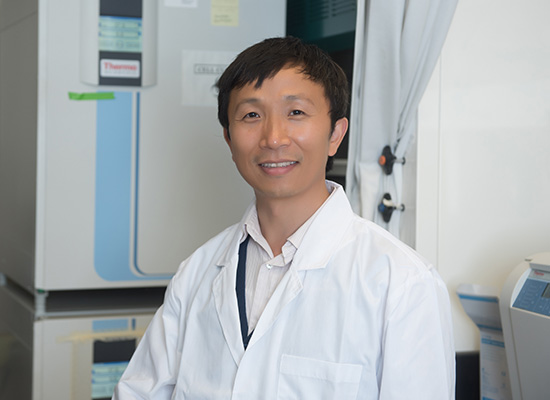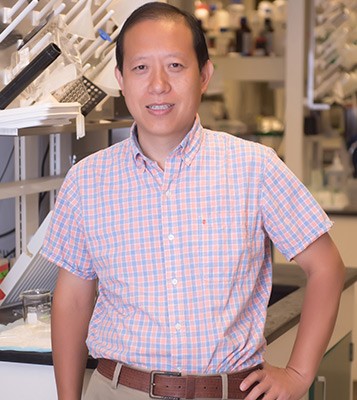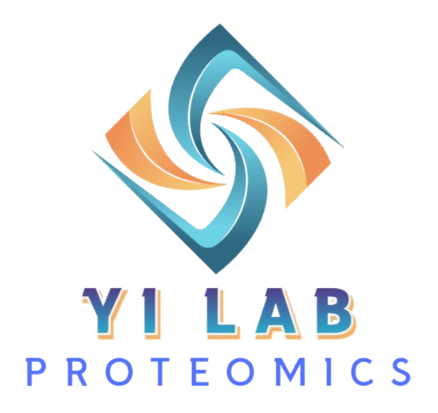
Degrees and Certifications:
- 2004-2004: Postdoctoral research associate, University of Texas Health Science Center at San Antonio; Field of study: Proteomics & Diabetes
- 2000-2004: Postdoctoral research associate, Purdue University; Field of study: Protein Biochemistry
- 1997-2000: Ph.D., Nanjing University; Field of study: Supramolecular Chemistry
Positions and Employment:
- 12/2004 – 09/2005: Assistant Research Scientist, School of Life Sciences, Arizona State University
- 10/2005 – 01/2011: Assistant Research Professor, School of Life Sciences, Arizona State University
- 10/2005 – 01/2011: Director, Proteomics Research Laboratory, School of Life Sciences, Arizona State University
- 01/2011 – 08/2015: Associate Professor, Department of Pharmaceutical Sciences, Eugene Applebaum College of Pharmacy/Health Sciences, Wayne State University
- 01/2011 – present: Director, Proteomics Research Laboratory, Eugene Applebaum College of Pharmacy/Health Sciences, Wayne State University
- 08/2015 – present: Professor with tenure, Department of Pharmaceutical Sciences, Eugene Applebaum College of Pharmacy/Health Sciences, Wayne State University
- 09/2021 – present: Director, Graduate Program, Department of Pharmaceutical Sciences, Eugene Applebaum College of Pharmacy/Health Sciences, Wayne State University
Primary Research Interest
I have developed and maintained a vigorous independent research program (currently funded by two R01 awards by NIDDK) in the areas of insulin signaling, insulin resistance, diabetes, and proteomics. Insulin resistance lies at the base of an array of diseases or pre-disease conditions such as obesity, dyslipidemia, hypertension, cardiovascular disease, type 2 diabetes, and some cancers. However, the molecular mechanisms of its pathogenesis remain elusive. Insulin regulates a wide variety of biological processes, and defects in insulin signaling in skeletal muscle are considered to be among the main causes of insulin resistance and Type 2 diabetes (T2D). T2D has become a world and US epidemic. More than 530 million adults (i.e., >10% of adults) worldwide are living with diabetes. This number is predicted to rise to 643 million by 2030 and 783 million by 2045 (https://diabetesatlas.org/). In the US, 37 million adults (i.e., 14.7% of all US adults) have diabetes, leading to >$300 billion in health care costs annually. Projections indicate that the US diabetes prevalence may increase to ~30% in 2050 (www.CDC.gov). Among all diabetic cases, more than 90% are T2D. Intracellular actions of insulin are mediated by modifications of regulatory proteins and enzymes through protein-protein interactions as well as protein phosphorylation and dephosphorylation.
My research focuses on (1) The role of novel protein-protein interactions and phosphorylation in insulin signaling in the development of skeletal muscle insulin resistance and type 2 diabetes; (2) Molecular mechanisms of an FDA-approved oral formula in diabetic wound healing. My research significantly improves our understanding of the biology of insulin signaling and the pathogenesis of insulin resistance and type 2 diabetes and promises to discover novel drug targets to prevent and treat metabolic diseases. My research utilizes a combination of human clinical studies (directly measuring human physiology/pathophysiology), in vitro cell studies (for detailed mechanistic studies), and cutting-edge proteomics (for global analysis of cell signaling & for unbiased discovery). Proteomics offers the capability to simultaneously quantify multiple proteins, protein-protein interactions, and protein phosphorylation, providing a better picture of complex protein networks.
Awards and Honors
Ongoing Research Support
NIH/NIDDK, 1R01DK128937, Duration: 04/01/2021-02/28/2025
Title: Mechanistic study of Small-molecular Therapy in diabetic Wound Healing
This study explores the molecular mechanisms of an FDA-approved oral formula of small molecules, tRES+HESP, in diabetic wound healing in cell culture and animal models.
Role: Contact-PI (Other PI: Jie-Mei Wang)
NIH/NIDDK, 1R01DK119222, Duration: 01/01/2019-7/31/2024 (NCE)
Title: Alleviating Reactive Carbonyl Species-Induced progenitor cell dysfunction in diabetic wound healing.
Role: Co-I (PI: Wang, Jie-Mei & Monks, Terrence J.)
Completed
NIH/NIDDK, 1R01DK107666, Duration: 9/25/2015-08/31/2021
Title: Serine/Threonine Protein Phosphatase 1 in Insulin Resistance and Type 2 diabetes
This study explores role of protein phosphatase 1 regulatory subunit 12 in human skeletal muscle insulin resistance and type 2 diabetes
Role: PI
NIH/NIDDK, 2R01DK081750 renewal of R01DK081750, Duration: 08/01/2014-4/30/2019
Title: Human Skeletal Muscle Proteome & Phosphoproteome in Obesity and Type 2 diabetes
This study explores the function and regulation of protein phosphatase 2A in human skeletal muscle in obesity and type 2 diabetes.
Role: PI
Innovative Clinical or Translational Science Award # 1-16-ICTS-048
Duration: 01/01/2016-12/31/2018
American Diabetes Association
Protection against insulin resistance in obesity
The goal of this project is to identify factors responsible for protecting some obese individuals from becoming insulin resistant
Role: Co-I (PI: Jeff Horowitz, U of Michigan)
Translational Science Award #1-13-TS-27
Duration: 07/01/2013-06/30/2016
American Diabetes Association
Effect of Exercise on Human Skeletal Muscle Tyrosine Phosphoproteome
This study explores how exercise improves insulin sensitivity through novel tyrosine phosphorylation events in human skeletal muscle.
Role: PI
R56DK081750 Bridge award of R01DK081750 (PI)
Duration: 05/01/2014-7/31/2014
NIH/NIDDK
Title: Human Skeletal Muscle Proteome & Phosphoproteome in Obesity and Type 2 diabetes
This study explores the function and regulation of protein phosphatase 2A in human skeletal muscle in obesity and type 2 diabetes.
Role: PI
R01DK081750
Duration: 02/01/2009-01/31/2014
NIH/NIDDK
Human Skeletal Muscle Proteome and Phosphoproteome in Obesity and Type 2 diabetes
This study explores protein-protein interactions of IRS-1 and phosphorylation of specific proteins in the PI-3 kinase insulin signaling pathway in human skeletal muscle in obesity and type 2 diabetes.
Role: PI
3R01DK081750-01A1S1
Duration: 01/15/2010-04/30/2011
NIH/NIDDK
Administrative Supplements to R01 DK081750-01A1.
Role: PI
3R01 DK081750-04S1
Duration: 02/01/2012-01/31/2013
NIH/NIDDK
Research Supplements to Promote Diversity in Health-Related Research for a postdoc-fellow
Role: PI/Mentor
Clinical/Translational Award 7-09-CT-56
Duration: 07/01/2009-06/30/2013
American Diabetes Association
Regulation of the phosphoproteome in human skeletal muscle
This research assesses global changes in protein phosphorylation under both basal and insulin-stimulated conditions in insulin-resistant muscle.
Role: PI
Minority Undergraduate Internship Award
Duration: 01/01/2012-12/31/2014
American Diabetes Association
Research Supplements to Promote Diversity in Health-Related Research
Role: PI/Mentor
Professional Memberships
Member-in Grant Review Panels
External
• 06/2023 Study section member, NIH/NIDDK, Human Studies of Diabetes and Obesity (HSDO)
• 05/2023 Mail reviewer, Indiana Diabetes Research Center (IDRC) Pilot and Feasibility Program
• 07/2017-06/2021 Standing study section member, NIH/NIDDK, Clinical and Integrative Diabetes and Obesity (CIDO)/Human Studies of Diabetes and Obesity (HSDO), attend the study section 3 times per year
• 01/2012-12/2020 Standing clinical study section member, American Diabetes Association’s Research Grant Review Committee, attend study section once per year
• 01/18/2019 Mail reviewer, NIH/NIDDK, SPECIAL EMPHASIS PANEL, ZDK1 GRB-N (M1) PAR-18-111: High Impact, Interdisciplinary Science in NIDDK Research Areas (RC2)
• 07/11/2018 Study section member, NIH/NIDDK, SPECIAL EMPHASIS PANEL, ZDK1 GRB-N (O4)
• 02/2015, 10/2016 Study section member, NIH/NIDDK, CIDO.
• 11/2012, 10/2014 Reviewer, American Association of College of Pharmacy (AACP)
• 03/30/2012 Study section member, NIH/NIDDK, SPECIAL EMPHASIS PANEL, ZDK1 GRB-7 (M2), PAR08-182: R24 COLLABORATIVE INTERDISCIPLINARY TEAM SCIENCE
• 02/2011 Mail reviewer, NIH/NIDDK, SPECIAL EMPHASIS PANEL, ZDK1 GRB-J (M1), PAR08-182: R24 COLLABORATIVE INTERDISCIPLINARY TEAM SCIENCE
Internal
• 01/2018, 01/2019, 05/2019 Reviewer, GrantBoost, Wayne State University
• 03/2015 Reviewer, pilot award, Diabetes and Obesity Team Science, Wayne State University
• 03/2015 Reviewer, interdisciplinary and interdepartmental doctoral training programs by Diabetes and Obesity Team Science, Wayne State University
• 01/2015 Reviewer, FRAP award, EACPHS, Wayne State University
Reviewers-Journals
• Arabian Journal of Chemistry
• BBA: Proteins and Proteomics
• Cardiovascular Diagnosis and Therapy
• Cell Biochemistry & Function
• Current Proteomics
• Diabetes
• Expert Review of Proteomics
• Inflammation Research
• International Journal of Biological Sciences
• Journal of Clinical Endocrinology & Metabolism
• Journal of Nutritional Biochemistry
• Journal of Proteome Research
• Journal of Proteomics
• Journal of Proteomics & Bioinformatics
• Molecules
• Nature Communications
• PLoS One
• Toxicological Sciences
• Translational Proteomics
Recent university news spotlights on Zhengping Yi, PhD
Academic Recognition Ceremony celebrates faculty, staff excellence
Meet Our Team

Xiangmin Zhang, PhD
Assistant Professor (Research)
Areas of Expertise
Molecular biology
Virology
Immunology
Proteomics

Ruchi Jaswal
PhD Candidate
Areas of Expertise
Molecular biology
Virology
Immunology
Proteomics

Arifur Rahman
PhD Candidate
Areas of Expertise
Computational Biology Molecular Biology Lipid Research
Proteomics

Peyton Long
PhD Student
Areas of Expertise
Molecular biology
Virology
Immunology
Proteomics

Xiangmin Zhang, PhD

Ruchi Jaswal

Arifur Rahman

Peyton Long
